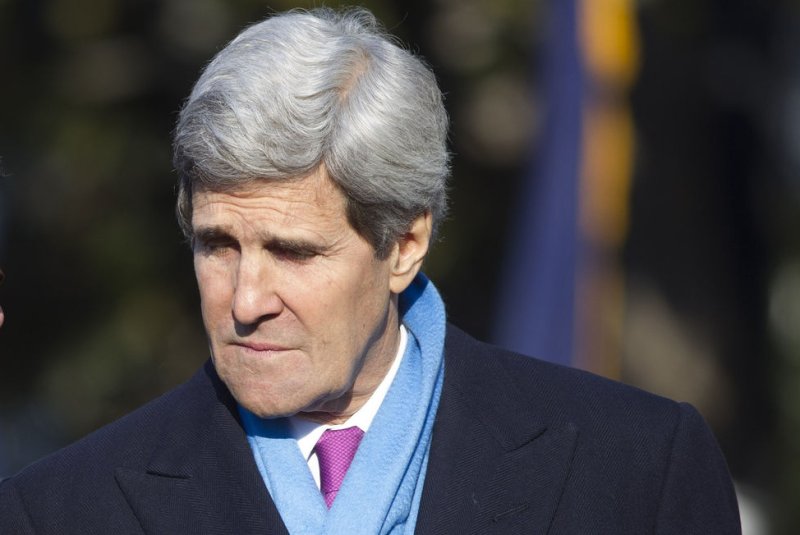1 of 2 | U.S. Secretary of State John Kerry, pictured on February 11, 2014, criticized the Syrian regime of "obstruction" at the second round of Syrian peace talks in Geneva that concluded on February 15, 2014. (UPI/Andrew Harrer/Pool) |
License Photo
WASHINGTON, Feb. 17 (UPI) -- The second round of Geneva II Syria peace talks concluded on Saturday, with the UN mediator apologizing to the Syrian people for the slow progress and the U.S. Secretary of State blaming the Bashar al-Assad regime for "obstruction."
UN-Arab League Joint Special Representative and Geneva II mediator Lakhdar Brahimi provided an update on Saturday after direct talks concluded between delegates from the opposition Syrian Coalition and the Syrian government.
Speaking at a press conference, Brahimi said "I am very, very sorry, and I apologize to the Syrian people that… we haven't helped them very much... People are dying, the country is being destroyed. If this track aims at helping the Syrian people, then of course, the faster we achieve tangible results, the better."
Secretary of State John Kerry issued a statement on Sunday that chastised the Syrian government for inhibiting progress at the peace talks, alleging the Assad regime of "obstruction."
"While it stalled in Geneva, the regime intensified its barbaric assault on its civilian population with barrel bombs and starvation. It has even gone as far as to add some of the opposition delegates at Geneva to a terrorist list and seize their assets. This is reprehensible."
Acknowledging the lack of significant progress in the first two rounds of peace talks and his hopes for a more successful third round, Brahimi said:
"It is not good for Syria that we come back for another round and fall in the same trap that we have been struggling with this week and most of the first round... So I hope that this time of reflection will lead the Government side in particular to reassure the [opposition] that when they speak of implementing the Geneva Communiqué they do mean that a TGB exercising full executive powers will be the main objective to follow."
Kerry commended the Syrian opposition for exhibiting a "mature seriousness" at the talks and presenting "a viable and well-reasoned roadmap for the creation of a transitional governing body and a viable path by which to move the negotiations forward."
With regard to moving forward, Brahimi noted that both the Syrian government delegation and the Syrian opposition delegation agreed to a third round of talks. "We suggested that the first day will be set for discussion on… ending violence and combating terrorism and the second day would be reserved for a discussion on the TGB [transitional governing body]."
When asked what message he would want to deliver to President Assad, Brahimi responded:
“My message to everybody involved in this terrible crisis is to think of the Syrian people, to think of the immense suffering that has been imposed on [them], the destruction that has taken place in Syria, and to think of what anyone can contribute to pull Syria out of the ditch in which it has fallen.”
The first round of direct Syrian peace talks were held from January 24 to January 31.
[United Nations]
[State Department]







